From an economic perspective, it is beneficial if policymakers invest in the bright minds of tomorrow and create a competitive, innovative and equitable education system in Germany. The Education Monitor - one of the most important studies on education in Germany - shows that Germany can do even better here.
Education and Training

About the topic
Schools and universities are not producing enough well-educated young people. This is leading to shortages of skilled workers, which are being exacerbated by demographic change and, as a result, falling numbers of schoolchildren and students as the workforce ages. This makes it all the more important for the state to invest in education and provide the best possible training for existing children and young people. The expansion of early childhood education and all-day care at daycare centers and schools will have a particularly strong impact. Good foundations at the start of education benefit later phases of education, when more is learned. At the same time, families can better realize their employment aspirations and thus also contribute to securing a skilled workforce. Through its subsidiary IW Junior, the IW is also committed to expanding economic education.


Securing skilled workers through immigration to universities
Against the backdrop of demographic change, Germany is increasingly dependent on skilled labour from abroad to secure growth and prosperity.
Wido Geis-Thöne IW

The Regional Distribution of Graduates in Germany
Graduates in Germany are distributed very unevenly across the country. Taking the population aged between 35 and 44, who have generally already completed their higher education, in 2019 the highest proportions of university graduates were to be found in Berlin ...
Wido Geis-Thöne IW

The Regional Distribution of Low-skilled Workers in Germany
Low-skilled workers in Germany are heavily concentrated in urban areas. In 2019, the proportion of 25- to 64-year-olds who had not completed at least two years of vocational training or higher education was almost twice as high in cities with a population of ...
Wido Geis-Thöne IW

Parental contributions for childcare in a regional comparison
The federal states take very different approaches to organising parental participation in the costs of state and state-funded childcare.
Wido Geis-Thöne IW
Our Experts

Dr. Christina Anger
Head of the Research Group Microdata and Method Development
Tel: +49 221 4981-718 Mail: anger@iwkoeln.de
Melanie Behrendt
Team Leader Human Resources and Communication at the Kompetenzzentrum Fachkräftesicherung and Network Q 4.0
Tel: +49 221 4981-702 Mail: behrendt@iwkoeln.de
Alexander Burstedde
Economist for Supply of skill needs
Tel: +49 221 4981-217 Mail: burstedde@iwkoeln.de Alexander Burstedde @ABurstedde
Annette Dietz
Senior Consultant for Human Resources Work
Tel: +49 221 4981-796 Mail: dietz@iwkoeln.de
Alissa Eschholz
Consultant for digital vocational training
Tel: +49 221 4981-538 Mail: eschholz@iwkoeln.de
Dr. Regina Flake
Senior Economist for Education and Training, Skilled Manpower Assurance and International Vocational Training Research and Team Leader KOFA
Tel: +49 221 4981-840 Mail: flake@iwkoeln.de
Dr. Wido Geis-Thöne
Senior Economist for Family Policy and Migration Issues
Tel: +49 221 4981-705 Mail: geis@iwkoeln.de
Susanne Jacobs
Consultant for digital vocational training
Tel: +49 221 4981-239 Mail: jacobs@iwkoeln.de Susanne Jacobs
Markus Körbel
Researcher for International Occupational Training Research
Tel: +49 221 4981-874 Mail: koerbel@iwkoeln.de
Kerstin Krey
Head of Education, Innovation and Immigration Research Unit
Tel: +49 221 4981-833Fax: +49 221 4981-99833
Mail: krey@iwkoeln.de
Louisa Marie Kürten
Consultant for Innovation and Change
Tel: +49 221 4981-785 Mail: kuerten@iwkoeln.de @Louisa_Kuerten
Judith Lehr
Consultant for personnel issues at the Competence Center for Skilled Workforce Development
Tel: +49 221 4981-855 Mail: judith.lehr@iwkoeln.de
Dr. Lydia Malin
Researcher for Supply of skill needs
Tel: +49 221 4981-850 Mail: malin@iwkoeln.de Lydia Malin
Dr. Christoph Metzler
Senior Economist for Vocational Training and Supply of skill needs
Tel: +49 221 4981-871 Mail: metzler@iwkoeln.de Christoph Metzler @TophAndre
Sarah Pierenkemper
Senior Economist for Supply of skill needs
Tel: +49 221 4981-884 Mail: pierenkemper@iwkoeln.de Sarah Pierenkemper
Prof. Dr. Axel Plünnecke
Head of Education, Innovation and Immigration Research Unit
Tel: +49 221 4981-701 Mail: pluennecke@iwkoeln.de @A_Pluennecke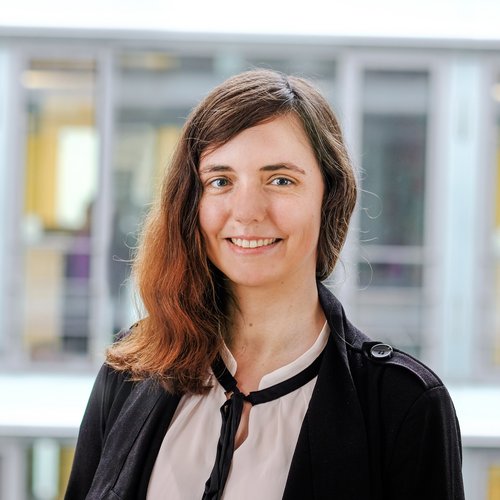
Paula Risius
Researcher for Digital Education and Skilled Workforce Development
Tel: +49 221 4981-680 Mail: risius@iwkoeln.de
Sibylle Stippler
Head of Vocational Education and Training Research Unit
Tel: +49 221 4981‑865 Mail: stippler@iwkoeln.de Sibylle Stippler @SibylleStippler
Dirk Werner
Head of Vocational Education and Training Research Unit
Tel: +49 221 4981-712 Mail: werner@iwkoeln.de Dirk Werner @DKW_followFrom an economic perspective, it is beneficial if policymakers invest in the bright minds of tomorrow and create a competitive, innovative and equitable education system in Germany. The Education Monitor - one of the most important studies on education in Germany - shows that Germany can do even better here.
From an economic perspective, it is beneficial if policymakers invest in the bright minds of tomorrow and create a competitive, innovative and equitable education system in Germany. The Education Monitor - one of the most important studies on education in Germany - shows that Germany can do even better here.
All news
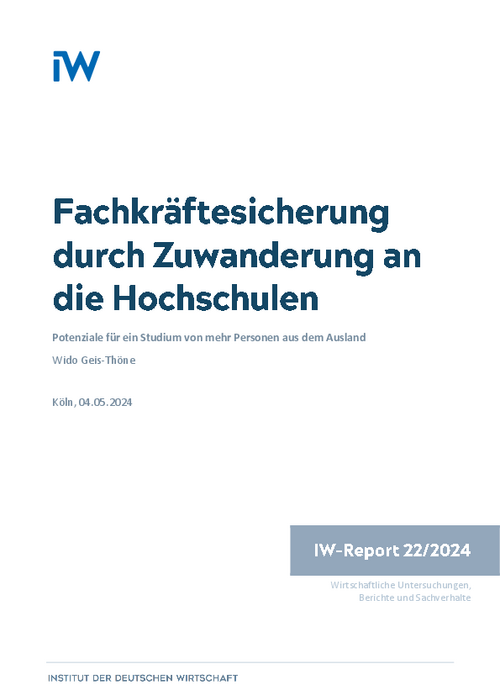
Securing skilled workers through immigration to universities
Against the backdrop of demographic change, Germany is increasingly dependent on skilled labour from abroad to secure growth and prosperity.
Wido Geis-Thöne IW
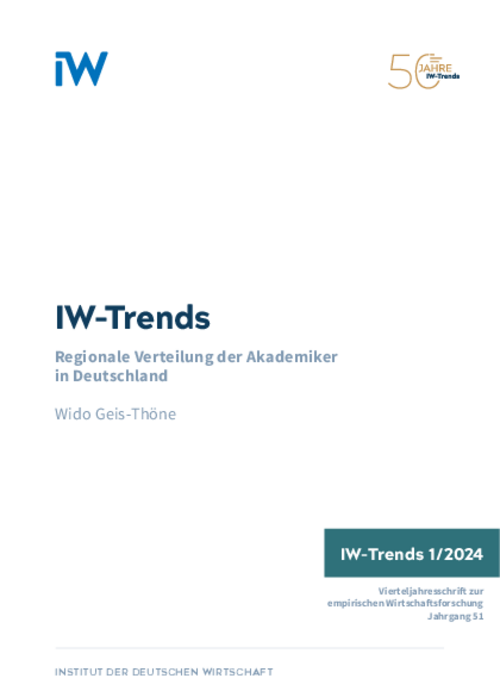
The Regional Distribution of Graduates in Germany
Graduates in Germany are distributed very unevenly across the country. Taking the population aged between 35 and 44, who have generally already completed their higher education, in 2019 the highest proportions of university graduates were to be found in Berlin and the Munich regional planning area.
Wido Geis-Thöne IW
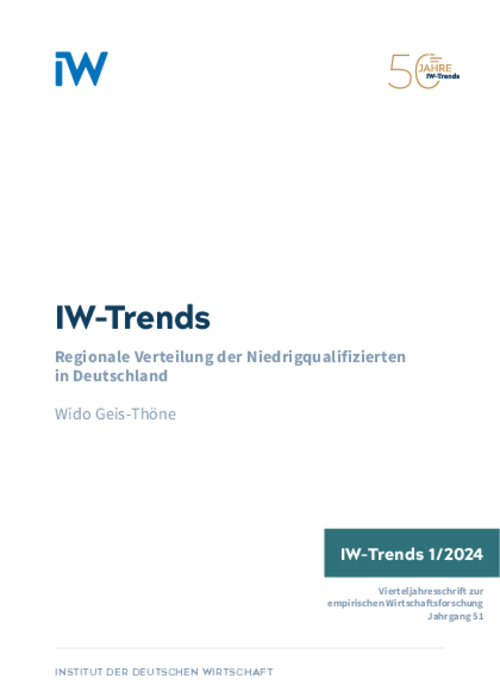
The Regional Distribution of Low-skilled Workers in Germany
Low-skilled workers in Germany are heavily concentrated in urban areas. In 2019, the proportion of 25- to 64-year-olds who had not completed at least two years of vocational training or higher education was almost twice as high in cities with a population of over 100,000 (20.8 per cent) as in small municipalities with fewer than 5,000 inhabitants (10.7 per cent).
Wido Geis-Thöne IW
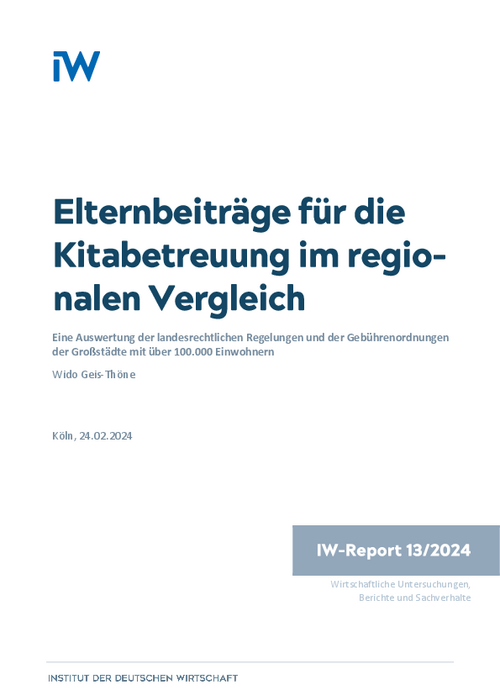
Parental contributions for childcare in a regional comparison
The federal states take very different approaches to organising parental participation in the costs of state and state-funded childcare.
Wido Geis-Thöne IW
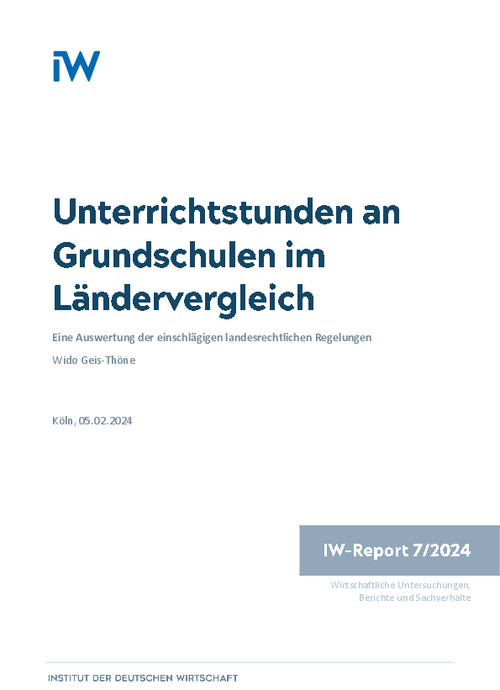
Teaching hours at elementary school country comparison
Young people's educational paths are very much predetermined during their primary school years. On the one hand, the basic skills of reading, writing and maths are acquired, and, on the other hand, the joint learning of all children ends with the transition to secondary level I.
Wido Geis-Thöne IW
Your search returned an incorrect status. You may have selected too many filters. You can jump back to your previous selection to adjust your search.
With our new newsletters on the following topics you no longer have an IW publication.
We send out our topic-specific newsletters every month.
Register here
With our new newsletters on the following topics you no longer have an IW publication.




